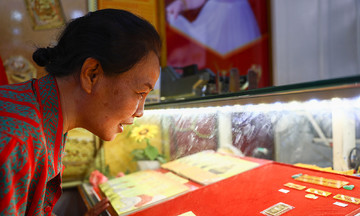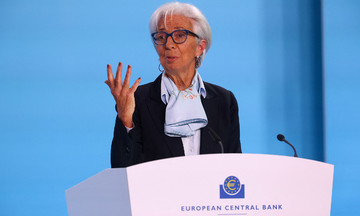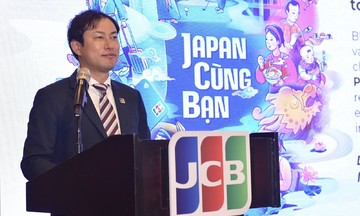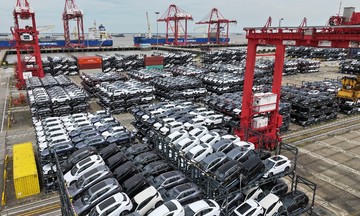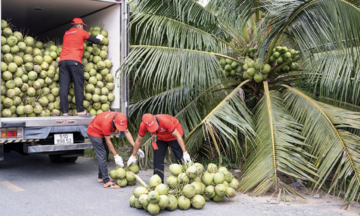Eco-labels are a policy tool to encourage businesses and consumers to switch to environmentally friendly products. This tool has been successfully applied in South Korea, Japan, China, Thailand, and European countries. In Japan alone, the market for eco-labeled products reached 44 billion USD in 2016.
In Vietnam, the legal framework for eco-labels was established in the 2005 and 2014 Environmental Protection Laws and finalized in the 2020 law. However, after 20 years, the results of applying this tool remain modest.
At the "Promoting sustainable production and consumption through eco-labels" seminar on 27/8, Nguyen Trung Thang, Deputy Director of the Institute of Strategy and Policy on Natural Resources and Environment (Ministry of Natural Resources and Environment), stated that only 13 products received certification between 2024 and the first half of 2025.
 |
Nguyen Trung Thang, Deputy Director of the Institute of Strategy and Policy on Natural Resources and Environment, at the event. Photo: Tien Phong |
Nguyen Trung Thang, Deputy Director of the Institute of Strategy and Policy on Natural Resources and Environment, at the event. Photo: Tien Phong
Eco-labeled products include biodegradable plastic bags or bags made from PE plastic with a recycled material content of over 20%. The Ministry of Natural Resources and Environment publishes the criteria for eco-labels (formerly the "green label" program) and updates the list of products and services, which is valid for three years.
According to Le Hoai Nam, Deputy Director General of Vietnam Environment Administration, the limited number of eco-labeled products is due to the weak capacity of domestic enterprises and a lack of resources for technological innovation. In addition, preferential policies are not clear.
For example, non-biodegradable plastic bags are subject to an environmental protection tax of 50,000 VND per kg to limit production and encourage a shift to environmentally friendly bags. However, Nam said that in reality, many small businesses evade taxes and continue producing regular plastic bags, making it difficult for biodegradable or recycled bags to compete on price.
More investors would help reduce the cost of the final product. Having entered the market for environmentally friendly bags in France in 2014, Nguyen Le Thang Long, Chairman of the Board of Directors of An Phat Bioplastics Joint Stock Company, recounted the technological battle among manufacturers that pushed product prices high. By 2020, when the market boomed, the ecosystem became more complete with many businesses involved in producing raw materials, helping to halve the price of these bags.
"This has tripled or quadrupled the market's growth, although it has not yet met our expectations," Long said.
From the demand side, the Deputy Director of the Institute of Strategy and Policy on Natural Resources and Environment said that domestic consumers are still more concerned with food safety than environmental issues.
An Phat Bioplastics representative said that the Vietnamese market faces many of the same difficulties as France previously. Changing habits from using plastic bags to paper or biodegradable bags takes years. He also emphasized the role of communication in converting users. For example, if consumers understand that using biodegradable bags to wrap meat will prevent microplastics from sticking to food like regular plastic bags, the transition will be more effective.
Creating and developing the market is one of three major policy groups that authorities are focusing on for green products, given the small size of the domestic eco-label market. According to the Deputy Director General of Vietnam Environment Administration, the State will play a pioneering role in leading the market with green public procurement policies, attracting the participation of the private sector and the public.
The second policy group involves administrative regulations that prohibit or restrict products that pose a pollution risk. According to the roadmap for reducing plastic stipulated in Decree 08 of 2022, Vietnam will completely ban the production and consumption of single-use plastics after 31/12/2030.
This roadmap will be implemented earlier in provinces and cities, with a ban on single-use plastics and non-biodegradable plastic bags in supermarkets, shopping malls, hotels, and tourist areas from the beginning of 2026. In Hanoi, the ban on these types of plastic will be applied in Quarter IV of this year to restaurants, hotels, beverage stores, and eateries within Ring Road 1, and expanded in subsequent years.
Nam said that this ambitious goal means businesses must quickly develop substitute products to supply the market.
The third policy group consists of economic tools, including taxes, fees, and financial incentives. Businesses producing green products can access low-interest loans from commercial banks or the Environmental Protection Fund.
In addition, the Ministry of Finance is leading the coordination with the Ministry of Natural Resources and Environment to amend the Law on Environmental Protection Tax to add several groups of goods that pose a pollution risk to the list of taxable items, besides plastic bags, expected to be submitted to the National Assembly for approval next year.
Thuy Truong




